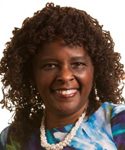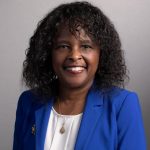TR: Your professional life sounds as if it pulls you in many directions. How have you made the time to volunteer?
Dr. Desir: As a private practice owner, I had the autonomy to decide whether to participate on committees and attend meetings. I chose to volunteer for the ACR because I enjoy doing so and value the organization’s incredible work on behalf of patients, rheumatologists and rheumatology professionals. After joining the Yale faculty, I was able to continue volunteering because the Yale Rheumatology Section has a culture of civic engagement, and many faculty members and fellows are active ACR volunteers.
TR: What is one of the accomplishments in your years of ACR service that stands out for you and will help readers understand why you are such a fervent volunteer?
Dr. Desir: I have been particularly pleased with the advocacy work I have done for the ACR. I have come to know both of my state’s senators and all five of Connecticut’s congressional representatives, especially my district representative, Rosa DeLauro, who is a ranking member of the House Appropriations Committee. One of the issues [GAC] worked on was the Pediatric Subspecialty Loan Repayment Program, which had been approved but not funded. When Representative DeLauro was the head of appropriations (during the 117th Congress), I was able to speak with her and explain the importance of this issue.
It has been an absolute pleasure working with our elected officials who care about our patients and our rheumatology professionals. It is important to be at peace with the slow pace of progress in Congress. It can sometimes take a decade or more to achieve results, but with persistence, good things can sometimes get done.
I would also like to mention another aspect of advocacy that I find very gratifying: traveling to Washington [D.C.] with patient groups to advocate for patient issues. It is amazing to see the lightbulb go off when an elected official hears the difficulties patients face in accessing care and truly begins to understand these issues.
TR: The ACR has many initiatives under way. Which ones are you hoping to emphasize during your term as ACR president?
Dr. Desir: One of our ongoing initiatives is addressing the workforce shortage, which is worsening each year. The average age of rheumatologists in the U.S. is over 55, so many retirements are looming. In fact, we forecast a shortage of 4,700 rheumatologists by 2030. This is a significant problem, and we will continue to address it through our workforce initiative.



